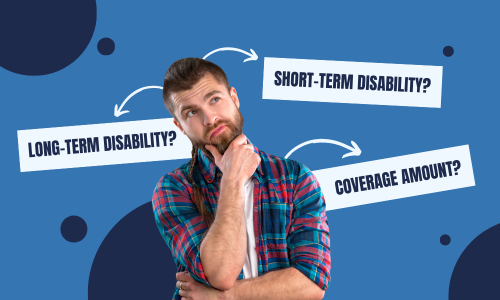Long-term disability insurance (LTD) is a critical but often misunderstood aspect of financial planning. It…

Meeting Financial Obligations After Disability: What’s Your Plan?
Approximately 37 million Americans are considered disabled; of those 37 million people, more than 50% are still in their working years (age 18-64), according to the Council for Disability Awareness. Unfortunately, many workers never even consider the fact that they could face a temporary or permanent disability, let alone plan for such a situation. What kind of a situation would you be in if you were to become disabled and unable to work?
Dipping Into Savings/Selling Investments
Even if you have an “emergency fund” in place for such situations, would you really have enough saved to cover months or even years of lost income? If you’re like most people, then you probably don’t. And even if you have valuable investments, would you really want to be forced to sell them? More than likely, you won’t be able to get their true value in such conditions.
Relying on a Spouse, Family, or Friends
Even if your spouse makes enough money to financially support you both, you’ll also want to consider the fact that you’ll likely have medical bills to pay off. Not to mention, depending on the severity of your disability, your spouse may need to take time off work to help take care of you. And if you’re like most people, you don’t want to have to swallow your pride and ask friends or family for financial help, either.
Taking Out a Loan
Without a reliable income, finding a bank that’s willing you lend you a loan can be difficult — even if you have excellent credit. Furthermore, there’s the issue of having to pay back your initial loan amount plus interest down the road. Can you afford that?
Collecting Employer or Social Security Benefits
If your disability was caused by a job-related injury, you may be entitled to workers compensation benefits for a period of time. Beyond that point, however, your employer may be legally allowed to find a replacement worker and stop paying out your benefits. Typically, you can’t collect social security disability benefits until the fifth full month after your initial disability, and only if it is expected to last 12 months or more. What happens if your disability doesn’t meet these requirements? Even if it does, can you wait six months for payment?
Plan Ahead with Disability Insurance
As you can see, the financial repercussions of a disability can be staggering. The only surefire way to protect yourself financially is to purchase a disability insurance policy for yourself, giving you added peace of mind and protection. Ready to get started with a disability insurance quote that suits your needs? Let the FICPA sponsored CPA Insurance Marketplace walk you through the process today.


